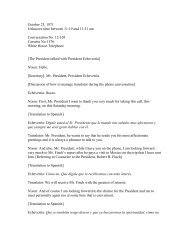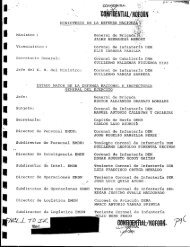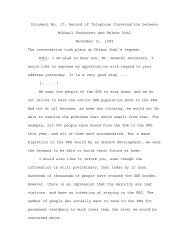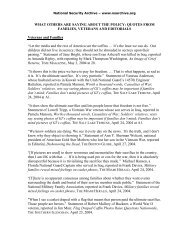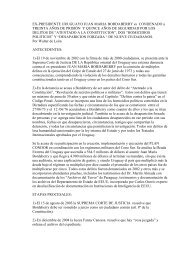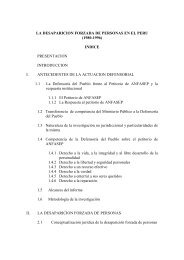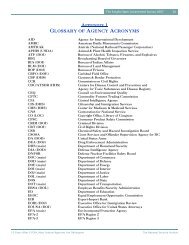(TRANSLATION FOR REFERENCE PURPOSES ONLY)
(TRANSLATION FOR REFERENCE PURPOSES ONLY)
(TRANSLATION FOR REFERENCE PURPOSES ONLY)
You also want an ePaper? Increase the reach of your titles
YUMPU automatically turns print PDFs into web optimized ePapers that Google loves.
public information has not yet taken root, such that we must make deep, permanent, and<br />
consistent efforts to change social values and perceptions of this matter.<br />
That we must clarify the principles governing the categories of classified and confidential<br />
information, taking into account the fact that no substantive right is absolute. Rights must<br />
at all times find a harmony with other juridical properties, with the caution that in this case<br />
the right of access to public information is to be the rule, and classified information the<br />
exception, as defined in the terms and figures prevalent in international democratic<br />
standards.<br />
That we need to develop a procedure for excercising the right of access to public<br />
information, including all necessary safeguards for helping and guiding individuals at the<br />
moment when they choose to exercise this right.<br />
That it is prudent to establish a time limit for responses to requests for information, and<br />
establish the principle that consulting public information should be free of charge, as well<br />
as a system of fees for compensating the costs of reproducing, searching for, and<br />
systematizing public information.<br />
That it is also indispensable to include the right of Habeas Data, which is the right of<br />
access to information concerning a particular individual held by public agencies that he<br />
may seek to learn in order to correct it, bring it up to date, or suppress it, and the right to<br />
know the use to which this information will be put.<br />
That we consider it necessary to create a State Commission for Access to Public<br />
Information as an authoritative body with autonomous budgets, operations, and decisionmaking<br />
powers, charged with overseeing compliance with the proposed Law as well as<br />
publicizing and conducting research on the right of access to public information; said<br />
Commission will be composed of three commissioners, of whom one will be president.<br />
That we must design procedures to streamline appeals for amendment brought before the<br />
public agency from which information has ben sought and denied, and appeals for revision<br />
in the second instance brought before the State Commission of Access to Public<br />
Information.<br />
That in this initiative, the sanctions that shall be applied to those who fail to comply with<br />
the provisions of the Access to Public Information Law are specified with crystal clarity.<br />
That in order to favor proper normative efficacy, we must have a system for the gradual<br />
entry into force of the specific sections of the Law itself, in order to carry out an active and<br />
intensive program of training and educating public agencies to routinely disclose<br />
information as well as receive individual requests.<br />
And that democratic life in Sinaloa will be enriched by legislation that both allows citizens<br />
to exercise this right and creates a culture of institutional openness; for which reasons,<br />
based on the constitutional provisions cited above, I submit for consideration the following<br />
initiative for:<br />
ACCESS TO PUBLIC IN<strong>FOR</strong>MATION LAW <strong>FOR</strong> THE STATE OF SINALOA




